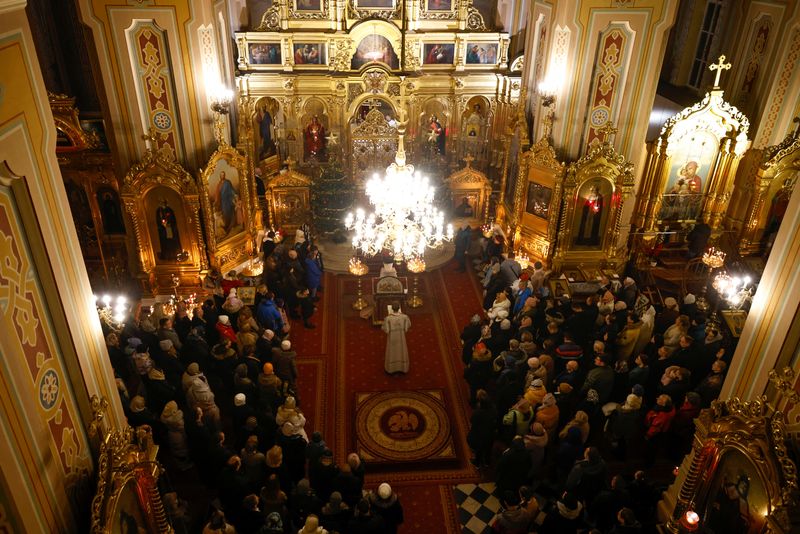

© Reuters. Polish and Ukrainian faithful attend the Christmas service at the Orthodox Cathedral of St. Mary Magdalene in Warsaw, Poland January 6, 2023. REUTERS/Kuba Stezycki
2/4
By Agnieszka Pikulicka-Wilczewska and Riham Alkousaa
WARSAW/BERLIN (Reuters) -Victoria, a Ukrainian refugee, is celebrating Orthodox Christmas in Poland with a simple prayer – that next year she will be back at home.
The 40-year-old is one of the millions of Ukrainians who have fled the Russian invasion of their homeland and are marking the holiday with mixed emotions – relief that they are safe, but sadness to be away from their families.
“The important thing is that it’s still a family holiday… We hope to celebrate next Christmas with our family back home,” Victoria said.
At a candle-lit Christmas Eve Mass under the great domes of the Cathedral of St. Mary Magdalene in Warsaw, priest Doroteusz Sawicki welcomes the new arrivals who have come to celebrate the birth of Christ.
“Two or three years ago we could wonder if anyone would knock on our door, now we know that someone is already there,” he told Reuters.
“Many of our brothers who have found themselves in Poland because of the war cannot return to their homeland. They will celebrate with us.”
Many Orthodox Christians celebrate Christmas on Jan. 7, but the Russian Orthodox Church’s backing for Moscow’s war in Ukraine has angered many Ukrainian Orthodox believers and splintered the worldwide Orthodox Church.
This year, some Ukrainians chose to celebrate Christmas with Catholics on Dec. 25 in protest at Russian aggression. But many have stuck to the Orthodox tradition.
For Victoria, who fled her home city of Irpin with her son in March last year, this is her first Christmas away from home.
“We lived in the basement for almost two weeks, then we left when the bombings started, and parts of the city were in ruins,” said Victoria, who did not want to give her full name.
In Poland she found shelter in a dormitory for refugees about two hours from Warsaw. Soon after, she found a job as a waitress not far from her new home.
Although she is safe with her son, Christmas is not the same. In her shared accommodation she does not have access to a kitchen and cannot cook traditional festive meals like she used to back in Ukraine.
“What’s important is the atmosphere and mood. It would be good to have a kitchen, but that’s secondary,” she said.
CHRISTMAS IN BERLIN
At the Nathanael Orthodox church in southwest Berlin, the usual congregation was joined by dozens of refugees attending the ceremony, priest Oleg Polianko told Reuters.
“We are of course sad because of the war but it’s Christmas and a happy occasion. God is our protector and is helping us,” Polianko said.
Marta Akopian, 25, from Donetsk, attended the Mass to reflect and pray. “I prayed for the strength and bravery for our army and of course for myself and my family,” she said.
For Helena, a 60 year-old grandmother from Lviv, spending Christmas in the German capital away from her family is difficult, she said. This time last year, before Russia’s Feb. 24 invasion, she still hoped a war could be averted.
Back in Warsaw, Ukrainian Irina Dolganych, 34, said this Christmas feels different and uneasy, even though she has lived in Poland for five years.
“We try because we have children and we don’t want them to feel this (tension), you can’t explain it to them, for them it is a holiday. Just like in my childhood, I looked forward to Christmas, I think it should be like that for them,” said Irina.
Irina planned to cook traditional dishes, something her mother in the Cherkasy region of central Ukraine cannot enjoy.
“My mother is not celebrating at all. I was talking to her half an hour ago. She doesn’t even have a Christmas tree this year.”
Victoria also managed to speak to some of her few family members with mobile phone reception.
“We can only pray for peace and that we finally have the opportunity to return home,” she said.






